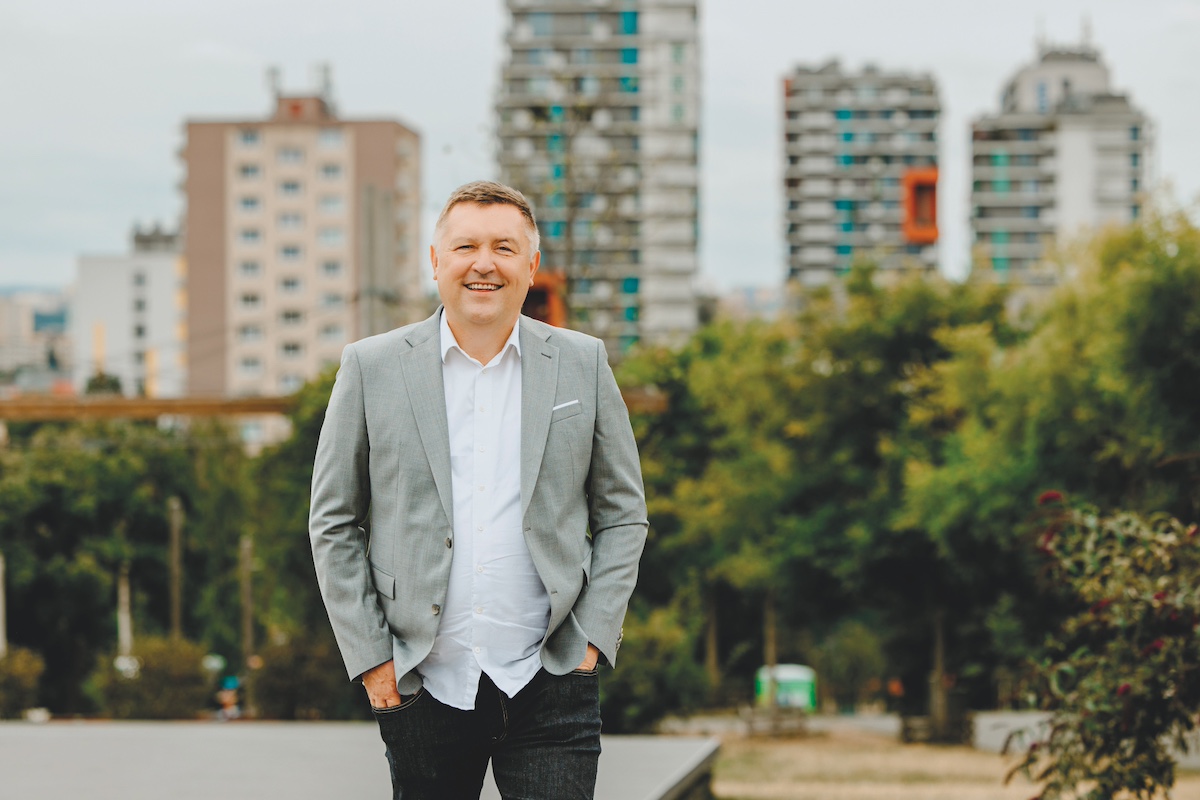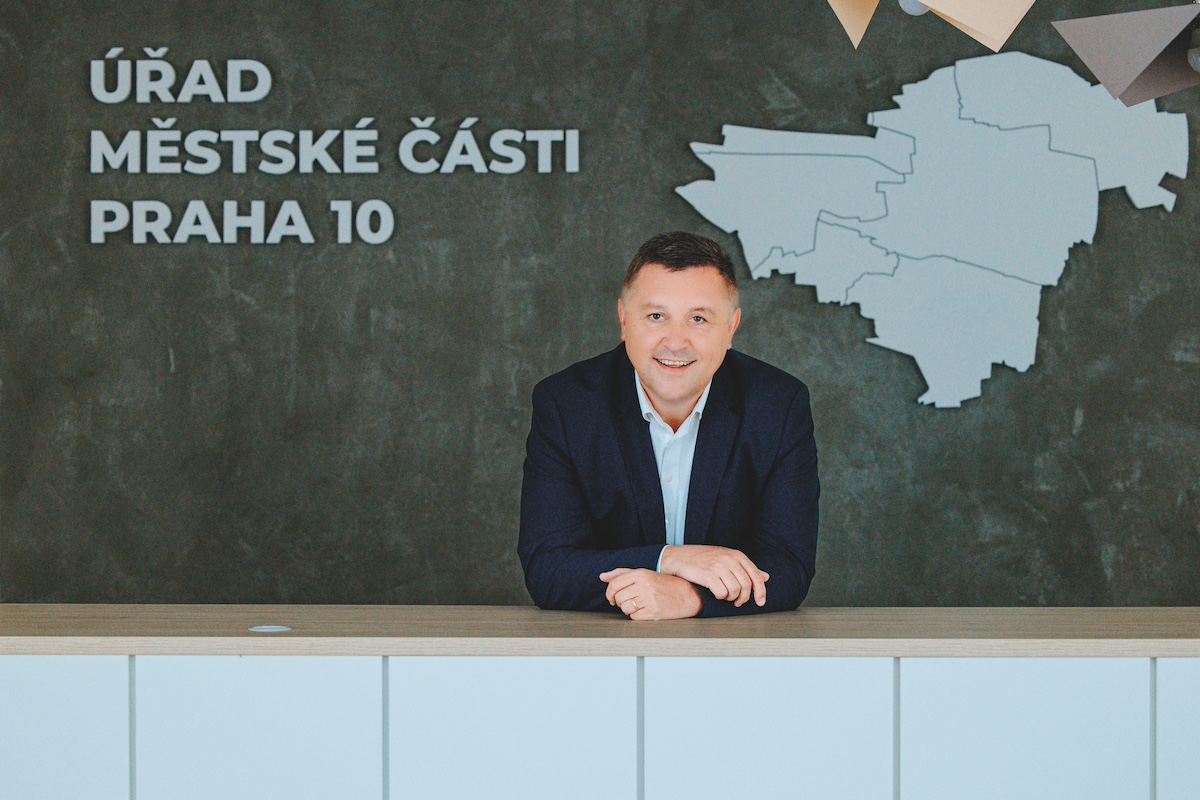“I stand by our election promises”
PRAGUE 10 GAINED 250 MILLION CZK THANKS TO PRIVATE SECTOR PARTICIPATION IN PUBLIC EXPENDITURES.

Martin Valovič, Mayor of Prague 10
Text: Martina Hošková, M.Zisso; Photo: Archive
As a local patriot, I wanted to contribute my energy and ideas to improving the place where I have lived my whole life,” explains Martin Valovič, Mayor of Prague 10 district. “Being a mayor is a beautiful job, and I appreciate the trust that the citizens and neighbours of Prague 10 have placed in me. I want to complete projects such as the reconstruction of the surroundings of Strašnická metro station, in order to show people that they have put their trust in people who have energy and determination.”
What would you like to tell our readers about yourself?
I became Mayor of Prague 10 two years ago, and since then I, together with my colleagues and coalition partners, have been constantly working on improving our district to make it an even better place to live.
As a graduate in architecture and a local patriot, I am responsible for urban development and the revitalisation of public spaces. This year, we are restoring the vicinity of the Botič creek. The pedestrian promenade will get a new surface, and new concrete terraces will be built near the Botič. All this will extend the recreational purpose of this popular leisure area.
Before entering politics, I had been in business for many years.
I have built two successful project and production companies. Therefore, I have also included the support of local small businesses in my list of priorities.
You are a member of the ODS political party. Do you draw your inspiration from there?
I have joined the Civic Democrats mainly because of the values and ideas this party represents. Its DNA firmly encodes such values as individual freedom, free market, and personal responsibility. In this concept, the state is a guarantor of fair and understandable rules, still able to show solidarity and offer help to those in need. It was the ODS that helped with the transformation of the Czech economy after the Velvet Revolution in 1989, and who had assisted in putting our country back on the European map.
As you said, you became the Mayor of Prague 10 two years ago. What brought you into local politics in the first place?
As a local patriot, I wanted to contribute my energy and ideas to improving the place where I have lived my whole life. As an architect, I was troubled by the condition of some public spaces, and by the lack of a clear urban strategy. Thus, I have entered politics because actions are better than words.
What actions do the responsibilities of your current position allow you to perform?
Being a mayor is a beautiful but demanding job that has no office hours. You become the face of the place where you live, and which you of course care about. The representative role is only a small part of my daily agenda, particularly when we speak of such a diverse and large district as Prague 10. In terms of population, it is equivalent to a regional city such as Liberec or Olomouc.
In addition, the mayor has to be a good moderator of discussions, as well as a mediator of disputes. There are various groups and diverse interests in the public space. Finding a compromise is challenging on some topics, but it is important.
An informal competence of the mayor is the ability to set the agenda. I would like to use this ability to popularise the beautiful villas in Strašnice, or to bring back the name Jindřich Waldes. In the First Czechoslovak Republic, this businessman’s name was known worldwide. He was nicknamed the Baťa of Vršovice. His snap buttons were produced and sold all over the world. Then World War II, and the Nazi occupation, came. Waldes died on his way to America. This disaster was then completed by the Communists, after the coup. I think this is our debt to him, to bring his name back from obscurity. Our first foray is the “Prague 10 Entrepreneur of the Year” poll, which we launched last year. The main prize is named after Jindřich Waldes.

“In terms of population, Prague 10 is equivalent to a regional city such as Liberec or Olomouc.”
Of course, you were already active before becoming mayor. As deputy mayor, you were the first to publish a detailed list of investor requirements. Was it helpful?
Thanks to specific and understandable rules for investors, the district has already gained CZK 250 million, and more contracts are currently being prepared. We are using the funds to increase school capacities.
When we were preparing the methodology, titled “Private Sector Participation in Public Expenditures”, in cooperation with the Department of Spatial Planning at the Faculty of Architecture, Czech Technical University in Prague, I was sure of the benefit of such a document. However, reality has exceeded my expectations. This methodology is also appreciated by investors, as they can cooperate with the city transparently.
In return, they have the assurance that the financial resources will be fully used for prearranged public beneficial purposes. In our case, we are mainly talking about the growth of school capacities.
If you could highlight one single project that you have on your agenda as mayor, which one would that be?
Time flies by unbelievably fast. As I said earlier, being a mayor is a beautiful job, and I appreciate the trust that the citizens and neighbours of Prague 10 have placed in me.
A lot has happened in those two years. Yet, I would like to highlight the project that will run through these four years like an ongoing thread, and that is the reconstruction of the villa of Karel Čapek.
Together with colleagues, we have the ambition to make this exclusive space a house museum that will be as famous as the Tugendhat villa in Brno.
What are the most troublesome problems for Prague 10, in your opinion? Do you share them with other Prague districts?
One of the big problems that we identified last year with other Prague mayors is the underfunding of Prague’s education system. It’s not just about its capacities, but mainly about low contributions. Although all costs have skyrocketed in recent years, the contribution per pupil has not changed for many years.
A major local topic is the tug-of-war over the future of the Bohdalec-Slatiny brownfield site. A few years ago, we prepared a territorial study for this extensive area, which included the creation of a new green district. Last year, the designers from the Railway Administration showed interest in this site. They wanted a huge sorting station to be built there. Eventually, we managed to find a compromise, and a huge barrier will not be built in the heart of Prague 10.
What are the main challenges for you and your colleagues?
Together with my colleagues, we agree that it is necessary to heal the finances of the municipal district in the following years.
I would like to have a balanced budget at the end of the election period. However, this plan is being complicated by the current economic situation, rapidly rising inflation, and energy prices.
Instead of one-off cuts, we are focused on systematic savings and on reducing the energy performance of buildings. And, of course, we must figure out what to do with the old town hall building in Vršovická after our move to Strašnice. This building, from the second half of the 1970s, requires a complete reconstruction. The building’s shell is in a state of disrepair, and there is also a danger of the windows falling down.
The repair costs are astronomical, and Prague 10 cannot afford them. We are currently having an economic analysis prepared by an external company. The analysis will tell us how to proceed with this building.
I must also mention the revitalisation of parks, and the care of green vegetation. The successful revitalisation of the northern part of Solidarity Park has won the Municipal Project of the Year award, in the public green vegetation category.
A mayor’s job comes with a lot of criticism. How do you handle that?
I take constructive criticism as an essential part of the debate. No man is infallible. Life is not black and white, and the opinions, positions, and life experiences of each of us differ. Criticism is also the job description of the opposition. I respect that. What is not close to me, and I will not say that it does not bother me, are various false attacks and accusations that occasionally appear in the public space.
What are your strategy and plans for the next few years?
I want to complete projects such as the reconstruction of the surroundings of Strašnická metro station, in order to show people that they have put their trust in people who have energy and determination. My colleagues and I stand by our programme declaration and election promises, and I believe that we will manage to fulfil most of them. I want to continue meeting people and the business community, and talking to them about topics and things that interest them, and which I can help them with.
Two years from now, after four years of acting as mayor, will people say you were effective?
That will be shown by the elections. They are the ultimate litmus test.

